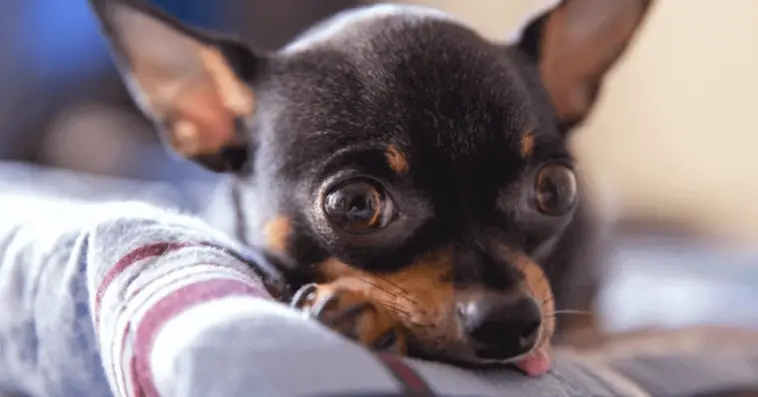Vaccines are mandatory for puppies but sometimes they cause side effects to your cute little pooch.
Chances are that you are bombarded with hundreds of questions including Is Frequent Urination In Puppies After Vaccination Normal?
In this article, we’ll find out
- 4 Reasons why your puppy is frequently urinating after vaccination
- How long does the frequent urination last?
- What are the other adverse side effects?
- Does vaccination cause pain to your puppy?
Frequent Urination In Puppies After Vaccination?
Frequent urination can be a mild side effect of the immunizations process. But if the peeing doesn’t stop in 24-48 hours, it requires serious attention. Excessive urination can be an indicator of urinary incontinence after a vaccine injection.
4 Reasons Why Your Puppy Is Frequently Urinating After Vaccination?
In dogs, regular urination can be separated into two types: incontinence, that’s more of a low level of awareness of urine, and persistent urination, which is more of a constant need to pee. It could be incontinence if you find your pet urinating in unusual places or at unusual times.
It’s likely that frequent urination is a symptom of illnesses such as cancer, kidney problems, or a systemic condition like Diabetes Mellitus if there are additional symptoms. It’s possible to tell whether your pet’s frequent urination is a symptom or a sickness based on the rest of his or her symptoms, according to Dr. Jennifer Coates, DVM.
1. Side Effects Of The Vaccine or Medication
For a day or so, some vaccinations and medications may induce frequent urination in your puppy, which is usually considered a minor adverse effect. If you’ve recently begun your puppy on a prescription and observe excessive urinating, call your vet to see if that’s a regular side effect for that medicine.
The other frequent negative effects in pups include decreased physical exercise and minor swelling or soreness at the site of injection. It is because the antibody in the vaccination is an alien intruder to your dog’s immune response.
Any resulting discomfort, swelling, or exhaustion should go away in one to two days. Sneezing or what appears to be a slight cold in your puppy may occur after receiving intranasal immunizations, but this should pass after a few days.
If the vaccine is to blame for the increased urine in your puppy, it usually goes away within 24 hours. If it’s still occurring after that period, call the vet and inquire if it’s usual. It could take a day or two for the frequent urination to stop, depending on what the vaccine was for.
Check out this video by Dr. Lera explaining the side effects of vaccination in puppies:
2. Possible Urinary Tract Infection
It’s possible that your puppy’s frequent urination is due to something other than immunization, such as a urinary tract infection.
According to PetMD, urinary tract infections are among the most common causes of excessive urine in dogs, and they can be very uncomfortable for them. If so, you should visit your vet so that the proper antibiotics can be administered.
A urinary tract infection can affect both pups and adults, and it can strike at any time.
3. It is just a coincidence
Your puppy’s excessive urination probably has nothing to do with the vaccination. There could be another health issue or merely just a one-time scenario, that is nothing to worry about.
4. Underlying Health Issue That Is Not A Result Of The Vaccine
Below are some of the underlying health issues that can cause frequent urination in your puppy:
- Urinary incontinence caused by urethral closure pressure
The urethral closure pressure can cause your puppy to urinate frequently. Typically caused by neurological issues, a full neurological examination is required. The frequency, duration, and severity of urine incontinence will vary in your puppy.
- Bladder infection
While a bladder infection isn’t the same as real incontinence, it does present in the same way. A bladder infection raises your puppy’s desire to urinate or damages the bladder, preventing it from holding urine (if left untreated for a long time). Urination in unusual places or frequent urination may result as a result of this.
- Obstruction of the urethra
If the puppy’s bladder is unable to drain entirely due to the blockage, the developed pressure can make leaks. This can cause your puppy to urinate multiple times without his knowledge.
- Hormone-responsive incontinence
This is more common among female dogs, although it can also happen in neutered male dogs. This occurs after the pet has been neutered, and it can happen months or years later. This condition can also lead to excessive urination in puppies.
Also Read: Chihuahua puppy vaccinations
How Long Does The Frequent Urination After Your Pup’s Vaccine Last?
In most normal cases the puppy should go back to its regular urinating schedule within 24-36 hours.
If your pooch continues to exhibit excessive urination then you must revisit the chances that factors other than vaccines could be the causation. In such cases of ambiguity, take your pup to the vet.
Also Read: How To Potty Train A French Bulldog
Why Does My Puppy Feel Unsettled After vaccination?
It’s very natural for your puppy to be weary, even sluggish, during the first 48 hours after vaccination. Also, it’s not uncommon for some edema to develop at the injection site. It’s possible that your puppy won’t want to feed much and that you’ll hear it sneezing or hacking. All of these are common vaccination responses.
Any resulting discomfort, swelling, or exhaustion should go away in one to two days. Mucus production or what appears to be a slight cold may occur after receiving intranasal immunizations, but this should pass after a few days.
Moderate vaccination effects aren’t usually noticeable. If your dog’s behavior has changed significantly, you should consult your veterinarian. If your puppy is experiencing trouble breathing, such as gasping, or if the lethargy is extreme, causing your pup to be limp, you must seek medical attention from your veterinarian.
The immune system and attitude of a puppy influence how it reacts to injections. Regardless, all signs should be minor and unconcerned. If your puppy’s symptoms persist after three days, it’s important to return to the vet to find out what’s wrong.
What Are The Other Adverse Reactions Of A Vaccination On Puppies?
Vaccinations in puppies have considerably more advantages than hazards. Vaccine responses in dogs are uncommon. Puppy vaccination, like any drug or immunization procedure, might have negative effects. We do recommend having your puppy or dog immunized at a time when you will be able to observe them afterward.
There are certain minor reactions that your puppy may have, according to Dr. Ernest Ward, DVM such as
- Fever
- Lethargy
- Appetite loss.
- Vomiting
- Diarrhea
- Swelling or pain at the injection site
More significant adverse reactions may occur in your dog, warns Dr. Ernest Ward, DVM, and you should be on the lookout for those signs:
- Constant vomiting
- Consistent diarrhea, also known as bowel incontinence, is a condition in which the bowels lose control on a regular basis.
- Swelling of the snout, face, or eyes, which can manifest as a puffy or swollen appearance of the face, lips, or head
- Difficulty breathing, characterized by loud breathing noises or the appearance of fighting to take breaths, becoming blue, and increased chest protrusion or effort
There’s also the risk that your dog will simply pass out, which might be life-threatening. If your dog falls, it could be due to a side effect that affects their respiration or heart.
Contact your veterinarian right once if this happens. The sooner you contact a veterinarian, the sooner you can begin treatment to reverse the negative effects. If you have any concerns about bad effects, you should consult your veterinarian to make sure it isn’t a dangerous condition.
Also Read: Yorkie Vaccine Schedule
How Long Does It Take For A Puppy To Get Back To Normal After Vaccination?
It usually takes up to 24-48 hours for the puppy to get back to normal.
Beyond that time frame calls for a serious watch for the above-mentioned symptoms. If your puppy acts out any of those symptoms then please consult your vet immediately.
Does Vaccination Cause Pain To My Puppy?
Dog vaccinations are similar to human vaccination in terms of pain.
A slight prick when the puncture of the needle into your pooch will be the only pain and it is quite endurable depending on the size and age of your pup. Do carry No products found. or No products found. though!
Why Does My Dog Not Pee After Vaccines?
Your dog may be feeling unsettled after getting the vaccine shot. Soreness at the injection site and the stress of the entire process sometimes can be a bit overwhelming for dogs.
Hence, it is possible, that your dog is feeling uneasy, and doesn’t want to get up and pee due to all the grogginess. Provide him access to water and food, and observe him for around 2 to 4 hours.
Even after 4 hours your dog doesn’t pee, it is advisable that you give your vet a call.
Why Does My Dog’s Behavior Change After Vaccination?
It’s no surprise that vaccines aren’t pleasant for humans, so it’s understandable that they wouldn’t be fun for puppies. Vaccines, though, are vital for a healthy lifestyle, and as much as it hurts to see your pet in agony, they are crucial.
If your dog is sick, he will most likely give you all the indications you have to know something that is wrong. Make sure you’re on the lookout for his cues and don’t overlook things like drooling mouth, pushed forward ears, trembling and cowering ears droop
Following your dog’s vaccinations, there are a few things that could happen. Mild adverse effects are by far the most normal response. However, in severe circumstances, you may discover that your puppy is allergic to something (called anaphylaxis). Certain vaccines, such as rabies vaccines, says Dr. Monica Tarantino, DVM, can have extremely particular side effects.
1. Anaphylaxis
Anaphylaxis is an allergic response that can occur when any sort of vaccine is administered to a dog. When animals are given immunizations that have a higher amount of proteins, this sort of reaction is more frequent. The more specific ingredients used, the more likely your dog is to be sensitive to one of them.
Anaphylaxis can result in life-threatening complications, but vaccinations can be given at the veterinarian’s clinic. Veterinarians are familiar with the anatomy of dogs and can give emergency care if necessary.
2. Autoimmune Issues
After receiving a shot, puppies may acquire autoimmune hemolytic anemia. This sad ailment can have a long-term impact on your dog. It usually happens with vaccines that include live antigens, such as parvo.
3. Consequences
Vaccines frequently cause less serious adverse effects near the injection site. Pain, splotchy skin, itching, inflammation, swelling skin, and abscesses are examples of these problems. In more severe situations, your dog may acquire a tough skin patch.
Needles are a natural phobia for dogs, and who can blame them? They’re definitely not your cup of tea. However, there are several things you can do to prepare them for a better outcome. First and foremost, ensure your dog does not have a bad connotation with immunizations.
Make the vet’s office a place where you get lots of treats, showing appreciation, love, caresses, and hugs. This should make your dog less frightened as he enters the veterinarian’s office. You might begin by teaching your dog to recognize syringes.
Due to all the above-mentioned reasons, the dog’s behavior tends to change after getting a vaccine shot.




